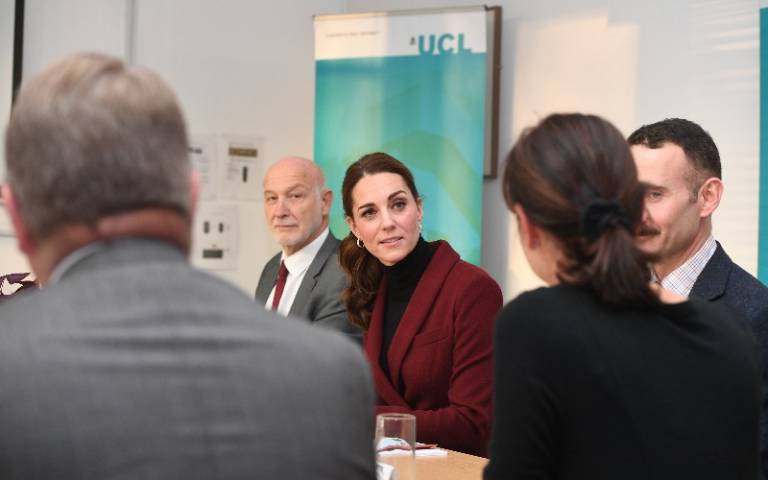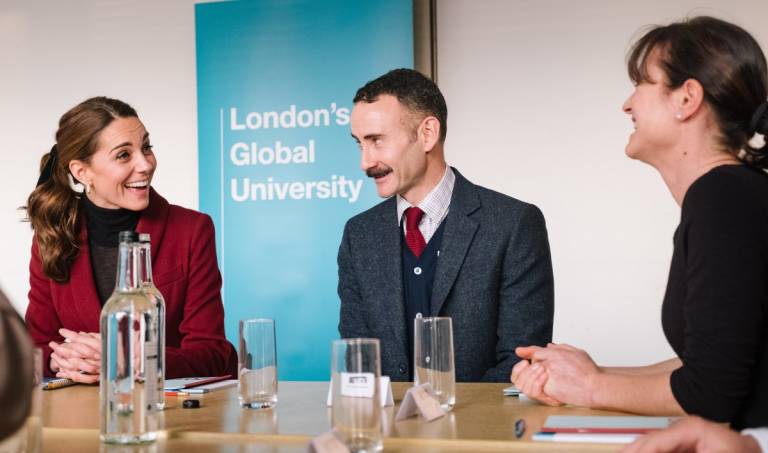Duchess of Cambridge visits UCL developmental neuroscientists
22 November 2018
The Duchess of Cambridge today visited a team of UCL’s world-leading developmental neuroscientists who are conducting ground-breaking research into how environment and biology interact to shape the way in which children develop both socially and emotionally.

During the visit, The Duchess met with leading academics as well as students in UCL Psychology & Language Sciences to learn about developmental neuroscience at UCL.
One of The Duchess’ key areas of interest is championing the importance of providing solid social and emotional foundations for children to support their development and emotional resilience as infants, setting them on the best possible pathway for a happy and healthy adulthood.
Professor Eamon McCrory (UCL Psychology & Language Sciences), the lead academic for the visit, said: “Our cutting-edge neuroscience research is shedding new light on how the brain develops in the early years. What we are learning has the potential to significantly improve the lives of children and their families. I am delighted and truly honoured that Her Royal Highness has shown such interest in our work and is supporting vital research in this area.”
UCL President & Provost, Professor Michael Arthur, said: “We’re delighted that Her Royal Highness is hearing from UCL’s developmental neuroscience researchers, as UCL takes great pride in its neuroscience and psychology work. We hope that this can help leverage the work of our neuroscientists as they seek to improve the lives of people affected by mental health disorders and ensure that every child has the best possible start to life.”
Professor McCrory is a Co-Director of the UCL Developmental Risk & Resilience Unit. As a researcher, he uses brain imaging to investigate changes in brain structure and function in children following early adversity. This work is providing important clues as to how vulnerability, particularly to mental health problems, can emerge across the lifespan. As a clinician, he is very interested in how this knowledge can improve the ways in which we can help children and families in the early years. The long term goal is to move to towards a preventative model of help, where mental health problems are prevented before they emerge.
The Duchess also heard from Professor Peter Fonagy, Head of UCL Psychology & Language Sciences, Professor Essi Viding, Professor Pasco Fearon and Dr Nikolaus Steinbeis (all UCL Psychology & Language Sciences).
Professor Fonagy studies the development and neurobiology of mental health conditions and conduct problems, and develops psychosocial treatments such as a group intervention for aggression and a project working with mothers incarcerated with their infants.
Professor Viding, also Co-Director of the UCL Developmental Risk & Resilience Unit, focuses on the genetic and environmental origins of conduct problems in children, such as information processing biases that can increase the risk of aggressive behaviours, in order to find better ways to promote health emotional and behavioural development.
Professor Fearon researches the development of attachment – the natural and instinctive bond that babies form to their primary caregivers, which provides them with a sense of safety and supports their learning and long-term emotional development – in a research programme that includes testing new interventions and working with policy makers.
Dr Steinbeis studies the development of behavioural control – the ability to resist temptations in the pursuit of long-term goals and the subjective experience of feeling in control – and designs training programmes aimed at improving behavioural control in children, to reduce their later risk of mental health disorders.
She also discussed with Professor Cathy Price (Director of the Wellcome Centre for Human Neuroimaging, UCL Queen Square Institute of Neurology) how research had changed in the last 20 years and how we can now study individual brains rather than comparing groups of brains to one another.

Duchess of Cambridge, Professor Eamon McCrory and Professor Cathy Price
Her Royal Highness also met two students enrolled on UCL’s MSc programmes in child development, based at the Anna Freud National Centre for Children and Families, one focused on clinical training and one focused on neuroscience research.
For over 25 years UCL has worked with the Anna Freud Centre to deliver world leading postgraduate programmes in child mental health, and more recently in developmental neuroscience. In partnership with the Centre, UCL is training researchers and clinicians in child development and mental health with over 300 students enrolled.
Further information:
- UCL Psychology & Language Sciences
- UCL Developmental Risk & Resilience Unit
- Professor Eamon McCrory's academic profile
- Professor Peter Fonagy's academic profile
- Professor Essi Viding's academic profile
- Professor Pasco Fearon's academic profile
- Dr Nikolaus Steinbeis' academic profile
- Professor Cathy Price's academic profile
Images
- The Duchess of Cambridge meeting with UCL staff and students (Top image facing camera: Professor Peter Fonagy, The Duchess of Cambridge and Professor Eamon McCrory)
 Close
Close

